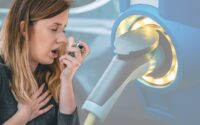Are cracking knees cause for concern? Experts weigh in
When standing up from a squat or a seated position, many of us are greeted by the familiar snap, crackle and pop of our knees, but is the sound cause for concern?
Orthopedic experts are sharing what causes the cracking and when to seek medical treatment.
Cracking, clicking or popping knees are a common occurrence, particularly as the body ages. There are many reasons why knees make this sound, including cavitation.
“Cavitation is when you have two surfaces form a vacuum,” Daniel Wiznia, an orthopedic surgeon at Yale School of Medicine, told HuffPost on Monday. “The sound is produced as the two joint surfaces snap apart and the joint fluid forms almost like a little gas, and that makes the sound.”
A knee fart, if you will.
How your kneecap tracks on the end of your thigh bone can also create cracking, “The kneecap, as it tracks…can sometimes find a path where there’s a little ridge or bump within the cartilage within that path. That causes a little bit of a snap, and that’s normal,” Wiznia explained.
If the snap, crackle and pop coincide with pain, swelling, joint instability, something moving around inside the knee or the knees locking out, it could be a sign of something more serious.
Folks experiencing these symptoms should make a doctor’s appointment, as they could be dealing with a range of issues including meniscus tears, cartilage damage, arthritis or thickened tissue from an injury.
In rare cases, the clicking could indicate avascular necrosis, a condition where the blood supply to the bone is compromised, and the bone dies. This can lead to joint collapse, which generates knee pain and a clicking sound.
The clicking of the knee could also be a sign of crepitus, which occurs when cartilage wears down and two surfaces of bone grind against one another.
“It can be loud, and sometimes you can even feel it when you put your hands over your knee. That means that the patient has arthritis,” Wiznia told HuffPost.
Osteoarthritis, the most common form of arthritis, is caused by wear and tear on the protective layer of cartilage on the ends of our bones. It has been compared to the deterioration of tread on a tire.
Wiznia notes that not all arthritis is painful or requires surgery to treat. Nonoperative measures include nonsteroidal anti-inflammatory medications, physical therapy and injection therapy.
Experts report that cracking and popping tend to happen when people get up from low positions, as the movement puts more stress on the kneecap. This stress is exacerbated if a person lacks the strength to maintain proper form when rising to their feet.
Constance Chu, a professor of orthopedic surgery at Stanford University, tells HuffPost, “In this situation, knee health and function can be improved with learning how to properly strengthen the body and improve how the body moves, even if there is already some arthritis.”
To build strength, Chu recommends checking in with a physical therapist or taking steps to lead a more active lifestyle, as exercise has repeatedly been shown to help people prevent and manage the symptoms of arthritis pain.
As The Post previously reported, research shows that people who cycle often have significantly less chance of developing osteoarthritis by the age of 65.
Chu stresses that healthy knees are crucial to maintaining mobility, and in turn, mobility is a key factor in supporting overall well-being, especially as we age.


